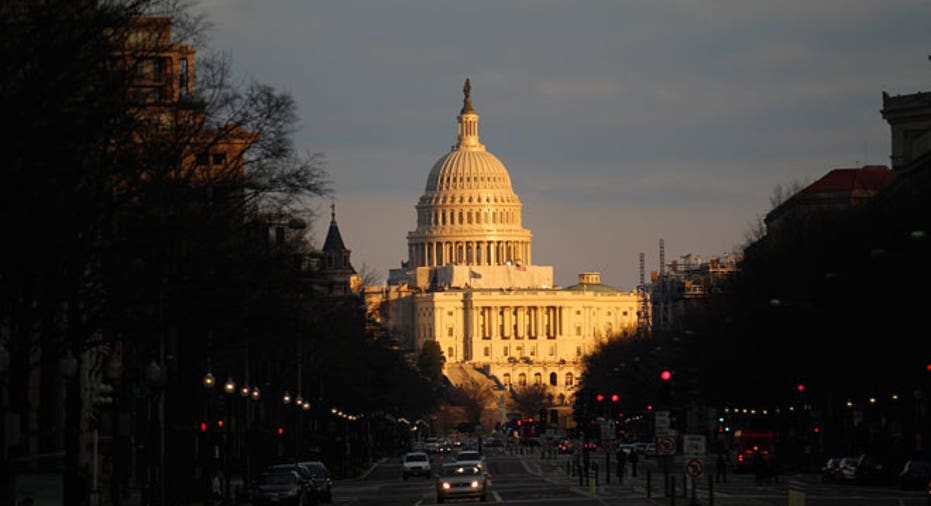Sequestration Not Living Up to Past 'Crises'

Sequestration hasn’t seemed to capture the nation’s attention in quite the same way as past manufactured fiscal crises.
Perhaps it’s the term itself. Few people know what sequestration actually means and fewer still can explain its origins.
And clearly sequestration, fairly reeking as it does of Washington, D.C., wonkishness, lacks the panache of, say, a "fiscal cliff," falling far short descriptively from that recent verbal threat in terms of its ability to raise a panic.
Then there’s the possibility that many Americans actually broadly agree with any plan that requires the U.S. government to scale back on spending, especially a plan that doesn’t discriminate among programs.
Sequestration, for better or worse, requires across-the-board spending cuts totaling between $44 billion and $85 billion in 2013 (depending on whose numbers you believe). So, no one’s pet causes are spared: military projects favored by Republicans are facing the same percentage of cuts as social programs treasured by Democrats.
In other words, the cuts, whether you approve of them or not, are widely viewed as being doled out fairly.
And to add some perspective, the $44 billion to $85 billion in proposed cuts will come from a 2013 budget that calls for $3.8 trillion in spending. Pocket change at best.
But back to the initial point. Few Americans would argue that the federal government couldn’t and shouldn’t scale back on spending, given the broad knowledge that the U.S. budget deficit is currently tipping the scales at a record breaking $1.1 trillion. Add to that a growing awareness that the deficit will only grow as health-care costs and entitlement expenditures tied to popular programs such as Social Security and Medicare soar as millions of baby boomers approach retirement age.
So if not viewed necessarily as a "win-win," Americans apparently aren’t viewing sequestration as a "lose-lose" either. Most don't seem to care one way or the other.
Sequestration Lacks Imminent Threat
Other recent crises manufactured in Washington by politicians hoping to further their singular agendas have included imminent threats of tangible and sizable ramifications.
The debt limit crisis in the summer of 2011, which served as a template for all of the crises to follow, involved a looming threat of U.S. default, a once-unthinkable humiliation for the largest and most important economy in the world.
And despite a last-minute compromise -- one that included the creation of the sequestration cuts now poised to take effect -- another parallel threat came to fruition: ratings firm Standard & Poor’s slashed the U.S. credit rating for the first time in history, a move that roiled markets for several days and put a dent in America’s long-held position of economic superiority.
Another budget impasse in December of 2011 caused in part by the abject failure of a bipartisan "super committee" formed specifically to slash government spending included the threat of a full or partial government shutdown. It’s unclear which party would have received the blame for such a closure, but neither side apparently wanted to risk it given how badly Republicans fared after the federal shutdown of 1995.
Then there was the fiscal cliff in December. That deadline posed not only the same threat of mandated across-the-board budget cuts, but also broad tax increases that would have hurt middle-class Americans far more than the wealthy.
That threat was also eliminated -- or, more accurately, postponed -- by virtue of a last-minute deal, heralded with much fanfare at various media events.
The fiscal cliff deal brought us to where we are today, hours away from the mandated across-the-board cuts first proposed in 2011, ostensibly as an option so absurd some type of budget compromise would be inevitable. But that never happened.
Scare Tactics
Instead we have the president, members of his administration and various Democrats warning of all manner of Armageddon if the cuts go into effect. President Obama warned earlier this week that homeland security could be threatened by delays to repairs to Navy aircraft carriers caused by the proposed budget cuts.
Air traffic control, public safety, food inspections, access to public parks, and many other services provided by the federal government are all at risk if no agreement is reached to stave off the cuts, the president suggested.
Meanwhile, Obama’s education secretary Arne Duncan speculated that 40,000 teachers could be laid off if the cuts go into effect. And Immigration and Customs Enforcement released several hundred illegal immigrants citing the need to reduce costs ahead of sequestration, a move sharply criticized by Republicans.
But neither side seems in any hurry to reach a compromise on sequestration, apparently comfortable that the impact won’t be severe enough to warrant an immediate backlash from the public.
They’re probably right. Apparently it’s not just Republicans who believe the Democrats are using scare tactics in an effort to pressure Republicans into concessions on raising taxes as part of a deal to avoid sequestration.
Most Americans either aren’t paying attention to this manufactured crisis, aren’t falling for the scare tactics, or believe the cuts aren’t the worst thing to happen in Washington lately.



















